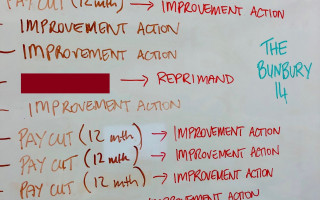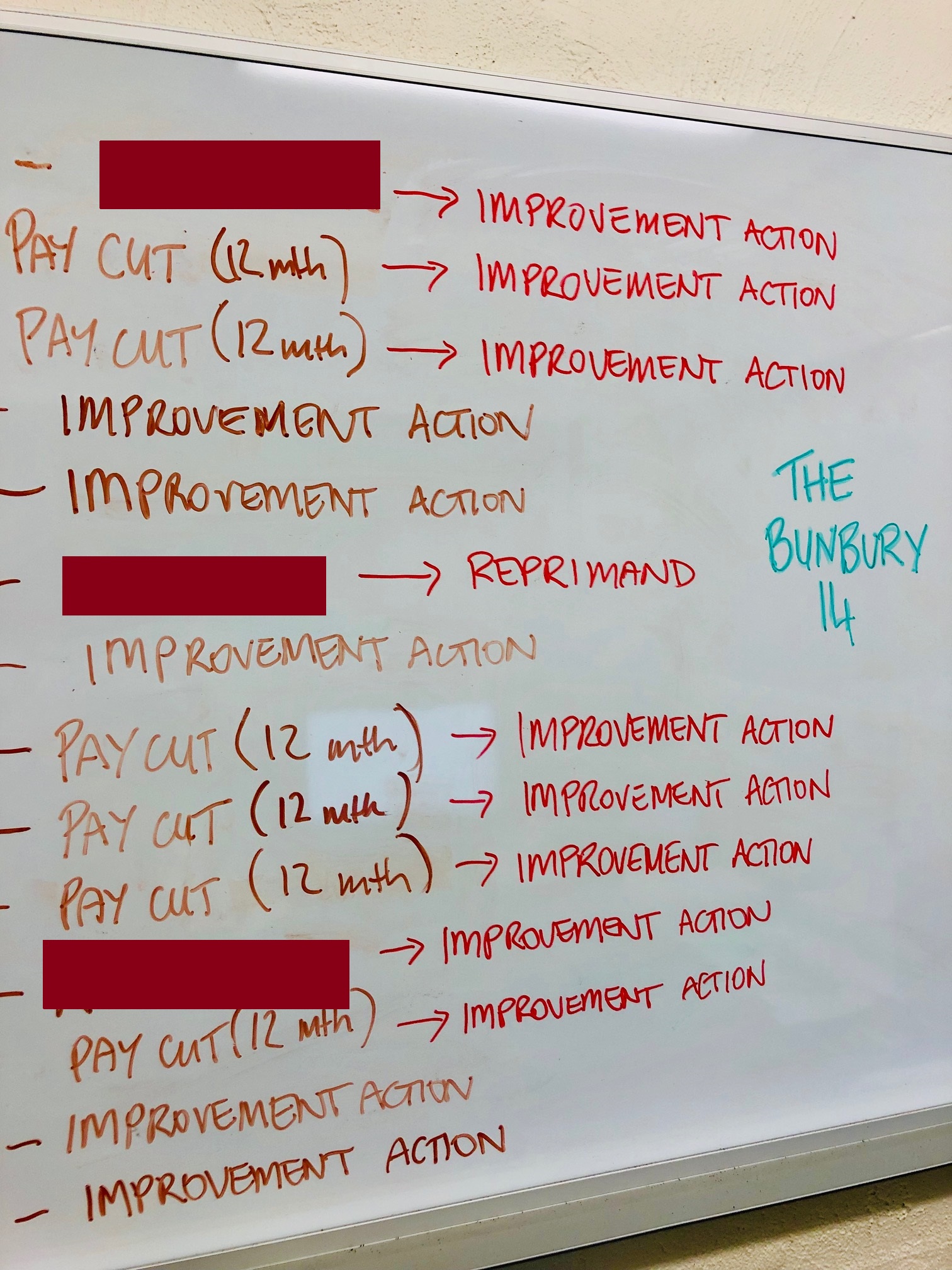Operation Night Shift Concludes
Thursday 14 Mar 2019
The Department of Justice launched “Operation Night Shift” in 2018 as a mechanism to proactively identify misconduct among Prison Officers. The objective was to review archived CCTV camera footage from night shifts across the Corrective Services estate to try and catch Prison Officers doing the wrong thing. Essentially they were looking for evidence that Officers may be ‘inattentive to duties’ (ie. sleeping), hence WAPOU Members’ coming to affectionately term the operation as ‘Pillowgate’.
Nine specific dates between January and March 2018 were selected for the CCTV review. The Bunbury Regional Prison (BRP) Pre Release Unit (PRU) was the first to be targeted, followed by West Kimberley Regional Prison (WKRP). By May 2019 fifteen Prison Officers at BRP had been issued ‘suspected breach of discipline letters’. Thirteen Officers then received letters at WKRP sometime later.
BRP’s WAPOU Industrial Officer, Hsien Harper, was the first to draw together all of the allegations at Bunbury and identify a range of common industrial concerns that ultimately lead to the following assessment: The formal disciplinary action being taken against our members was both unjust and harsh. This kicked off an argument between our Union and the Department that was to drag out for nine months. The WKRP disciplinary matters were put on hold pending the outcome of the BRP case.
In March 2019, WAPOU received correspondence from the Executive Director or the Professional Standards Division that the proposed disciplinary action to be taken against our Members was to be ‘discontinued’, with the exception of one unique case out of all 28 individual cases across BRP and WKRP.
The BRP case is deeply complex and multi-faceted, so we shall only briefly outline below the key components that WAPOU Members across all prisons should be mindful of.
The case against BRP WAPOU Members
The CCTV footage in the BRP PRU administration building only shows a corridor and various Officers moving in and out of various rooms throughout the shift. There is no footage from inside any of the rooms themselves.
The allegation that Officers were inattentive whilst on duty is implied through footage showing the movement of cushions and/or blankets from one location to another, various room doors being closed, various lights being switched off and no obvious movement from inside a room for certain periods of time.
The Department asserts Officers may have been inattentive. Each BRP Officer responded individually to that allegation, and overwhelming to stated they were attentive and responsive to their duties.
Let it be clear, WAPOU does not object to the notion that Officers should always be attentive and responsive whilst on duty and for the full period of a 12-hour night shift. However, there is no actual footage showing otherwise at BRP. No-one is seen to be actually sleeping, no incidents occurred and no calls, alarms or visitors went unanswered on any of the night shifts scrutinised.
Management Intervention should have been utilised in first instance
There is an industrial relations convention that employees should reasonably know they are doing the wrong thing before formal disciplinary action is taken against them. But, at no point were these Officers were made aware they were allegedly not meeting a required standard of behaviour, let alone there would be consequences for doing so. These Officers genuinely believed their night shift practices were in accordance with the expectations of their own local management.
Obviously the first step from local management is to clearly establish expectations, yet Senior Officers were not issuing RMFs to Officers for being inattentive prior to the disciplinary action. No Principal Officer issued a broadcast raising any concerns or requiring any changes in routine or behaviour. The PRU Assistant Superintendent was completely silent about any alleged inappropriate behaviours until after the formal disciplinary action had commenced. Until formal disciplinary processes were initiated Officers were universally unaware they might be perceived to be behaving in a way contrary to the wishes of the employer.
The decision to evoke formal disciplinary processes was contrary to best practice which dictates such concerns should have been handled locally with the least formality in the first instance. Operation Night Shift skipped this basic step and went straight to unjustifiably harsh and heavy-handed action against Prison Officers.
What will happen now?
It looks like Operation Night Shift as we knew it is over. The Commissioner has now issued two Custodial Operations Broadcasts (9 of 2019 and 10 of 2019) instructing Superintendents to perform regular but random night checks of their prisons, and to review night shift Duty Statements and incorporate a reference to “professionalism, integrity and vigilance”. Duty Statements are supposed to be reviewed and amended by 15 March 2019.
There are a number of actions Members should now expect from their local management in relation to night shifts.
- Superintendents should be having genuine discussions with Officers about expectations and develop a shared understanding of what “professionalism, integrity and vigilance” looks like on night shift. These discussions should be backed up with written notices and broadcasts.
- Any review of night shift Duty Statements should be done in full consultation with WAPOU Branch Representatives and affected employees, under clause 175. Introduction of Change of the Industrial Agreement. Members should be monitoring changes to ensure the duties are reasonable and achievable for night shifts and recognises the need to manage fatigue.
- Appropriate security mechanisms should already be in place in order to determine if a Superintendent’s random night visit is being conducted under duress or not under duress.
- Ergonomic chairs, pillows/cushions, blankets and so on should not be withheld if Officers require them to maintain their health, comfort and welfare during a night shift. It is not acceptable, from a health or safety perspective, for local management to remove or prohibit reasonable aids used for comfort by Officers during night shifts. Hazard Notices should be submitted where management is unreasonable.
Operation Night Shift demonstrated a big disconnect between what local management expected from Officers and what Officers understood local management expected from them. The lesson learned is that genuine staff consultation, to establish mutual rights and responsibilities, should have occurred prior to any disciplinary action.
The complex BRP scenario was brought about by the profound failures of BRP management to undertake their duty to manage their facility. Morale at BRP has taken a terrible blow over the last nine months, and relationships between Officers and local management are strained. But now it is over, and with the ongoing and united efforts of the BRP WAPOU Branch, there is an opportunity for the restoration of a more positive working environment.
Well done on sticking together, and sticking to your guns. Well done on the demonstrations of support you have shown each other during this distressing and lengthy period of time. Congratulations on this win. I hope this news is received well by you all. I know there has been a lot of damage done between the Department/local management and yourselves/your supporters, and it will take some time to repair, but hopefully you can now take a moment to pop the sparkling and say, “it’s over” – Hsien Harper, WAPOU Industrial Officer, notifying the Members of the discontinuance of disciplinary action

14 of the 15 BRP Union Members sought assistance from WAPOU to fight the allegations
